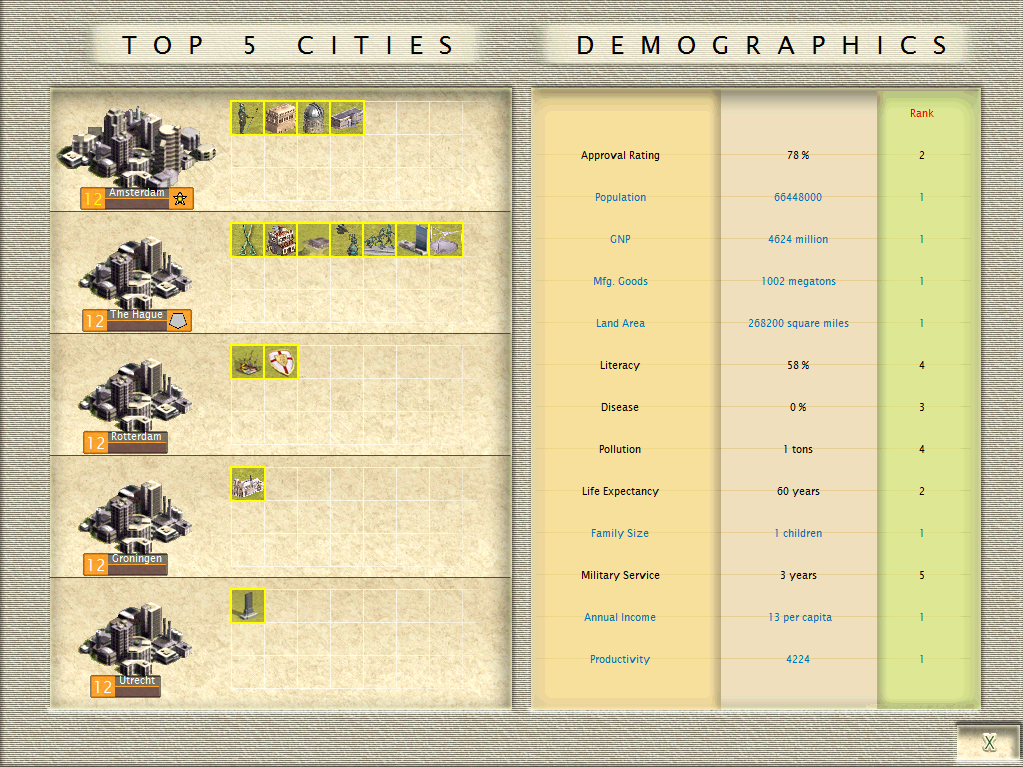This is the screen that time forgot, the screen that no-one cares about, the screen that punches your ego in the face even when you've played, as far as you can tell, as perfectly as possible. The screen has no meaning other than personal pride and a sense of perfection:

But what the crackerjack does any of it even mean? Where does it get these stats and how do you, as a player, play to manipulate them? And, for some, is it better to have a low score or a high score in them?
Ok, ok, ok, some are pretty darn obvious. So let's exclude Population, GNP, Mfg. Goods and Land Area, It's obvious you get these by having the most citizens, the most annual income, the most overall production and the most, well, land area.
Pollution, yes, that's pretty obvious too, it's 1 ton per square of pollution. In my games it always drops a pollution blob before you click end-turn before the victory screen, and always in a place where you can't do anything about it, it's like some kind of in-built 'thing'. But that's a different topic.
But now we get a bit more complicated:
Literacy - I'm guessing this relates to the number of Libraries/Universities you have? But is that all? And, it's a bit of an unfair stat on conquerors isn't it? What with you having to take empty cities on the turn it goes to the victory screen. Are we supposed to buy Libraries and Universities two and three turns after taking a city or something? And how come, even when you have all Libraries and Universities maxed in a long-standing civ it still might only give you 98% - what gives?
Disease - The only disease I know of is from Marsh/Jungle. And any disease rarely happens on the end-turn moment, it's kind of a one-off moment for very early cities. So how does it calculate this? How many Marshes and Jungles you have left un-worked at the end? And why am I third when I have 0%, can it not do the concept of joint-first? Or is it something else?
And then we move onto the ones I simply have no idea at all about:
Life Expectancy - ???
Family Size - ??????? (do you need this a high number or low number?)
Military Service - ????????????? (do you need this a high number or low number?)
Annual Income - GNP/Population ??????????
Productivity - Mfg. Goods/Population ????????????????
Approval Rating - The extent to which any remaining Civs are Gracious/Polite/Annoyed/Furious with you ???????????????????????????????
Any insight would be great, not for the "does it matter" but for the "niggling perfection"...

But what the crackerjack does any of it even mean? Where does it get these stats and how do you, as a player, play to manipulate them? And, for some, is it better to have a low score or a high score in them?
Ok, ok, ok, some are pretty darn obvious. So let's exclude Population, GNP, Mfg. Goods and Land Area, It's obvious you get these by having the most citizens, the most annual income, the most overall production and the most, well, land area.
Pollution, yes, that's pretty obvious too, it's 1 ton per square of pollution. In my games it always drops a pollution blob before you click end-turn before the victory screen, and always in a place where you can't do anything about it, it's like some kind of in-built 'thing'. But that's a different topic.
But now we get a bit more complicated:
Literacy - I'm guessing this relates to the number of Libraries/Universities you have? But is that all? And, it's a bit of an unfair stat on conquerors isn't it? What with you having to take empty cities on the turn it goes to the victory screen. Are we supposed to buy Libraries and Universities two and three turns after taking a city or something? And how come, even when you have all Libraries and Universities maxed in a long-standing civ it still might only give you 98% - what gives?
Disease - The only disease I know of is from Marsh/Jungle. And any disease rarely happens on the end-turn moment, it's kind of a one-off moment for very early cities. So how does it calculate this? How many Marshes and Jungles you have left un-worked at the end? And why am I third when I have 0%, can it not do the concept of joint-first? Or is it something else?
And then we move onto the ones I simply have no idea at all about:
Life Expectancy - ???
Family Size - ??????? (do you need this a high number or low number?)
Military Service - ????????????? (do you need this a high number or low number?)
Annual Income - GNP/Population ??????????
Productivity - Mfg. Goods/Population ????????????????
Approval Rating - The extent to which any remaining Civs are Gracious/Polite/Annoyed/Furious with you ???????????????????????????????
Any insight would be great, not for the "does it matter" but for the "niggling perfection"...




 ) and I tried some of the equations:
) and I tried some of the equations: